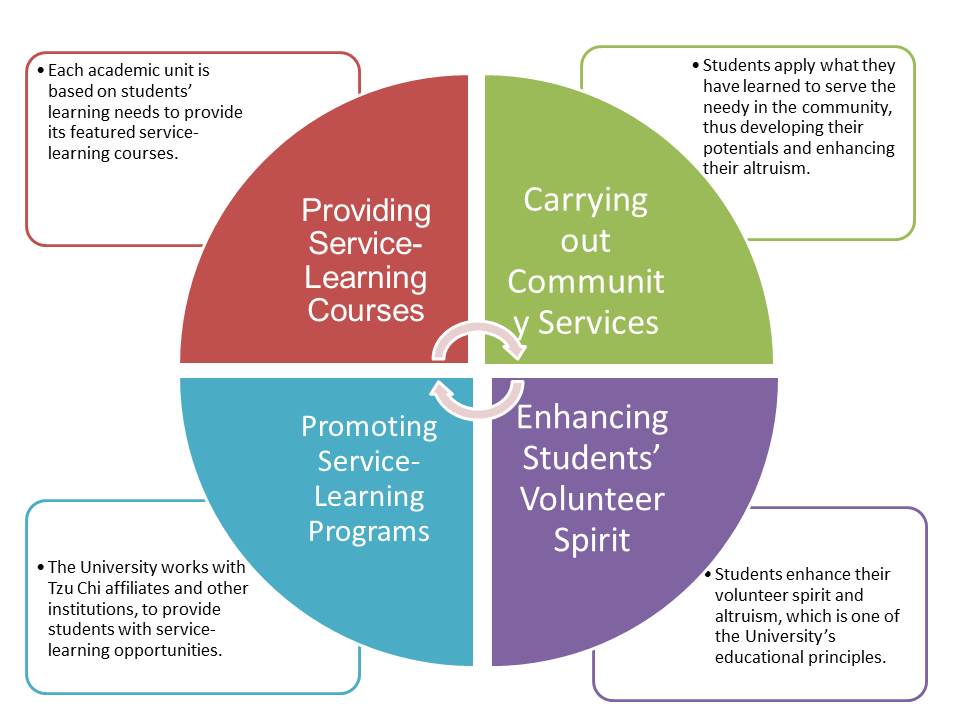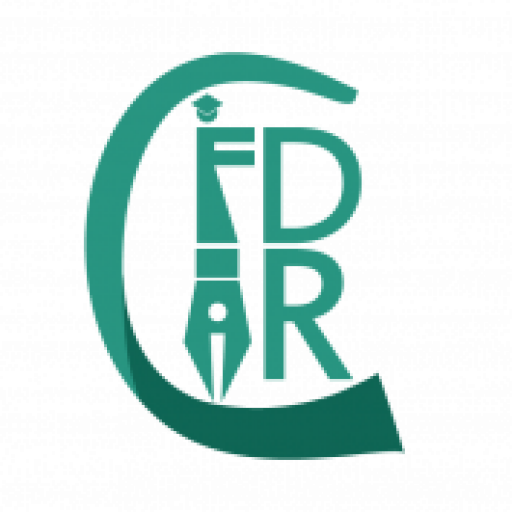History
To prepare students to become professionals with the skills, knowledge and spirit of Tzu Chi’s humanistic culture, the University has offered a variety of courses, since its inception in 1994, to help students cultivate their professionalism and humanism.
Tzu Chi Humanities and Service-Learning has been a University core course, and it is offered for students to know more about Tzu Chi Foundation. Tzu Chi Foundation is the University’s founder, and it has been attending to people’s needs, by carrying out its missions of charity, medicine, education and humanistic culture since 1966. Through this course, many students have been touched by how Tzu Chi volunteers have helped needy persons around the world, and as a result, their kindness and compassion are enhanced. Moreover, many of them have decided to serve others voluntarily.
The Ministry of Education has promoted service-learning programs among the universities in Taiwan since 2008. To answer this call, Tzu Chi University founded the Center for Service Learning, which was a unit of the Office of Academic Affairs, assisting each department/institute/center/program to offer featured service-learning courses, and inspiring students to infuse the volunteer spirit into their professional learning.
In 2008, the University’s Teaching Excellence Project was funded by the Ministry of Education, which had two goals, namely serving the needy in eastern Taiwan and enhancing students’ altruism and their volunteer spirit. Faculty members and students have attended to the needs of underprivileged individuals, families and communities in eastern Taiwan, through service-learning courses and activities, and by providing their volunteer services in healthcare and education.
In 2010, the University set up the Center for Faculty Development and Instructional Resources, so the Center of Service learning became a unit of this newly established Center and was renamed the Division of Service Learning.
Our major functions are:
- Promote service-learning projects, by combining professional courses with service learning elements.
- Bring in volunteer service activities with service-learning courses.
- Link the Teaching Excellence Project with service-learning programs.
- In addition, to assist students to share their learning from participating in service-learning programs, the Division helps them to share with their peers and their course instructor. Moreover, to encourage faculty members to take part in service-learning programs, the University provides the Excellence in Teaching Award to those who work with students in service-learning courses and activities.
Continuous efforts by the University’s faculty members, staff and students have helped develop various featured service-learning courses, and the University has received numerous awards from the Ministry of Education and other institutions.
Objectives
Assist each department/institute/center/program to provide service-learning courses, by linking professional learning with humanistic service, and inspiring students to apply what they have learned in their professional courses to serve the needy. Moreover, enable students to learn from their altruistic services.
Carry out service-learning programs, through well-designed courses/lesson plans, community service/health promotion activities, with instructor/volunteers’ accompaniment, and students’ reflections.
The goals of the Teaching Excellence Project are to serve the needy in eastern Taiwan and enhance students’ altruism and volunteer spirit. The project has been implemented for years to inspire students to engage in volunteer service and enhance their self-confidence.
The University has collaborated with Tzu Chi’s affiliates in charity, healthcare, education and humanistic culture, as well as other institutions, to provide a variety of service-learning programs, to attend to the needs of local communities. Moreover, the University expects to provide service-learning programs to help equip students with the skills, knowledge and humanism needed in the workplace.Our aims are:
| 1.Assisting each department/institute/center/program to provide service-learning courses |
| 2.Inspiring student clubs/organizations to sponsor service-learning activities to serve the needy in the community |
| 3.Carry out training programs and provide service certificates for student volunteers. |
| 4.Establish a platform for developing service-learning related volunteer services. |
| 5.Initiate collaborations between the University and other Tzu Chi affiliates in charity, medicine, education and humanistic culture to sponsor service-learning activities. |
Structure of service-learning

Members
| Members | Duties |
|---|---|
| Chief : Li-Fen Chang Phone: (03) 856-5301 ext. 1770 Email: lifen76209@mail.tcu.edu.tw | In charge of the Division of Service Learning. Supervise matters related to service learning. |
| Executive assistant: I-Ying Liao Phone: (03) 856-5301 ext. 1771 Email : iying@mail.tcu.edu.tw | Manage daily operations related to service learning. Handle other matters assigned to the Division of Service Learning. |
| Administrative assistant: Hui-Ju Chen Phone: (03) 856-5301, ext. 1771 Email : jaceny@mail.tcu.edu.tw | Assist in volunteer services. Assist underprivileged University students to serve the community’s needy. Help on other matters related to daily operations. |
Volunteer Service and Volunteer Service Record
Volunteer Service Record is every student’s service resume:
Volunteer service is not only a short memory for student volunteers. It is appreciated by needy people and an unforgettable experience for volunteers. The Volunteer Service Record is well recognized in Taiwan, and volunteer service will broaden students’ life perspectives.
Q1: How can I get my Volunteer Service Record?
AI:
- You need to complete basic training first. It is sponsored by the Division of Service Learning, lasts for six hours and consists of three classes, namely “Essence and Ethics of Volunteer Service”, “Laws and Regulations of volunteer service”, and a third class. You may also choose the other basic training sessions listed below:
- Search TCU MOODLE for the basic volunteer training session (six classes and nine hours).
- Basic training session provided by Taipei e-Campus (three classes and six hours).
- Under some conditions, you may be asked to take an advanced training session, which contains six classes and lasts for twelve hours. The following University units provide advanced training sessions:
- The Division of Service Learning
- Training for Goodwill Ambassador and student employees sponsored by the Office of Student Affairs.
- Center for General Education
- Office of General Affairs
- Student volunteers are required to take training sessions first. They will earn credits for taking advanced training sessions, and they will be provided certificates of completion, after attending the training sessions.
Q2: How can I update my Volunteer Service Record?
A2: Please do the following:
- Specify your volunteer service information, such as starting time, ending time, service recipient(s), participating volunteers, supervisor’s name, etc.
- Provide the record of service hours to the Division of Service Learning and staff will process the rest.
- Provide your Volunteer Service Record to the Division of Service Learning, and they will review the record and approve it.

